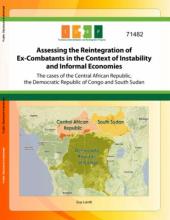Land Library
Welcome to the Land Portal Library. Explore our vast collection of open-access resources (over 74,000) including reports, journal articles, research papers, peer-reviewed publications, legal documents, videos and much more.
/ library resources
Showing items 1 through 9 of 14.This toolkit is the first of its kind to provide information on promoting and protecting the nutritional status of mothers and children in crises and emergencies. Latin America and the Caribbean is one of the most vulnerable regions in the world to major crises and emergencies.
Carbon finance recognizes the contribution of projects to mitigating climate change.
Tanzania's land, local government and forest laws mean that rural communities have well defined rights to own, manage and benefit from forest and woodland resources within their local areas through the establishment of village forests.
International policies to reduce carbon emissions from deforestation and degradation (REDD+) envisage the creation of financial incentive mechanisms that reward forest protection efforts and adequately compensate those actors that face new costs.
The implementation of effective Disarmament, Demobilisation and Reintegration (DDR) programmes in countries emerging from violent conflict are essential for building and maintaining peace and security.
This report seizes the opportunity to learn from existing evidence by analyzing lessons derived from impact evaluations produced between 2000 and January 2009 to begin to discern what has been effective in agriculture.
The purpose of this study was to provide a better understanding for policy makers and service providers of mobility and migration among ex-combatants and the effectiveness of Disarmament, Demobilization and Reintegration (DDR) programming in Uganda.
The Philippines has made significant progress in empowering women and in advancing gender equality. The government's policy on gender equality and women's empowerment has prioritized women's economic empowerment, advancing human rights and enhancing gender-responsive local governance.
Although recent developments have increased interest in African land tenure, Rwanda's nation-wide Land Tenure Regularization (LTR) program is one of a few models to address these issues at the required scale.









